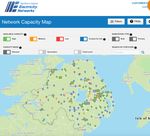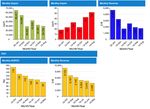Northern Ireland beats Renewable Energy Targets - Farm Energy Northern Ireland
←
→
Page content transcription
If your browser does not render page correctly, please read the page content below
SPRING 2020 MEMBERS NEWSLETTER
Northern Ireland beats Renewable INSIDE THIS ISSUE
Energy Targets • NI Renewable Targets
The Department for the Economy (DfE) has released Electricity Consumption
and Renewable Generation for Northern Ireland in for 2019. The latest results • 2020 Generation so far
show that 43.7% of total electricity consumption was generated from
renewable sources within Northern Ireland; an increase of 3% compared to • G59 and G99/NI
2018. Of the electricity produced, nearly 85% of it was from wind generation.
However, it is worth noting that these figures do not include electricity that • New Energy Strategy
is generated and consumed on site.
• ROCs Market News
In December 2019, 51% of total electricity consumption in Northern Ireland
was generated from renewable sources; considerably higher than the • Member News
corresponding figure for the same month one year ago (46.4% in December
2018). These figures are very encouraging and surpass the Executive’s 2010- Farm Energy NI Ltd
20 Strategic Energy Framework target of 40% of electricity consumption from Unit C2, 80-82 Rainey St
renewable sources by 2020. Magherafelt
BT45 5AJ
The Northern Ireland Renewable Obligation (NIRO) scheme was the main
policy driver which encouraged farmers and landowners to consider
renewable energy on their holding. When it was introduced in 2005,
028 7930 0606
renewable electricity consumption was at 3%. Attention now turns to a new
info@farmenergyni.co.uk
Energy Strategy for Northern Ireland in a bid to achieve net zero carbon
www.farmenergyni.co.uk
emissions by 2050.2020 generation starts high
FENI Members are reporting record levels of wind and hydro
generation for January and February 2020. Wind turbine
owners have experienced an increase of as much as 50%
compared to January 2019, with Storm Ciara and Dennis in
February helping push production 25% higher than January.
While this is great news, it must be noted that Autumn 2019
was a lean period for wind turbine operators, with
production well down on that in the previous year.
With record rainfall in 2020, hydro turbine operators are
also delighted with their production levels. While farmers
may complain about the recent wind and rain preventing
slurry spreading and the like, those with renewable projects
may have difficulty complaining!
G59 and G99/NI
Owners of grid connection renewable generators will be
familiar with the term “G59” and the tests that surrounded
the connection of their generator to the NIEN grid network.
In the context of a renewable generator, the G59 is
essentially a piece of equipment which monitors the quality
and stability of the electricity on the NIEN grid and compares
it against a predefined set of parameters (known as
protection settings) which are set out by NIEN. Voltage,
frequency, and RoCoF (Rate of Change of Frequency) are
NIE G99 Frequently Asked Questions some of the items monitored; should any of these go outside
Q: Do I need to contact NIEN if I want to of their limits, a circuit breaker will open automatically,
change my turbine? disconnecting the generator from the grid network.
A: Yes, under the law (ESQCR) you must do so However, G59 has been replaced with G99/NI since 27th
and if you fail to notify NIEN you have broken April 2019. This is an EU directive and has significant
the law! consequences for those people wishing to replace existing
Q: If I change the turbine tower, hub and equipment. Many popular wind turbine models are simply
blades but keep the original generator? not compatible with G99/NI without additional works. For
example, a wind turbine with an induction generator (such
A: If the original generator is being retained
as Vestas) are unable to meet requirements such as Low
then the turbine only has to meet the D Code
Voltage Ride Through (LVRT) where the retained voltage
requirements under the existing connection
agreement. drops to 15% and a reactive power range requirement of
0.95 absorbing to 0.98 producing.
There are other active power and frequency requirements
If you are thinking about altering your which an induction machine may need additional equipment
generating station contact NIEN via email at
in order to meet the requirements. It is also worth noting
connectiondesign@nienetworks.co.uk
that G99/NI is not retrospective.NIEN Grid Capacity Map now available
NIEN has released an interactive capacity map which allows
users to explore the Northern Ireland grid network and identify
areas in which there may be sufficient capacity for renewable
generators to connect.
It is well known that export capacity is a highly sought after
commodity, and it is no surprise that there is limited availability
on the network. While not 100% accurate, the tool gives
guidance as to the status of the local network. To view, please
go to: www.nienetworks.co.uk/connections/capacity-map
Future Energy Strategy in Northern Ireland – Call for Evidence
The Department for the Economy (DfE) recently released a call for evidence document in relation to a new energy
strategy for Northern Ireland. This is the beginning of an on-going public engagement process to inform and shape
future proposals on energy strategy. It asks recipients to provide evidence, data and views on a wide range of high
level issues that may assist in developing the direction of the future energy strategy, including the role of
consumers, energy efficiency, heat, power and transport. DfE are keen to hear from a wide range of bodies, groups
and individuals, from within the energy sector and also more generally across society.
In June 2019, the UK became the first major economy to commit to a 100% reduction in greenhouse gas emissions
by 2050 from 1990 levels. This ‘net zero’ target represents a significant step change in the commitment to
addressing climate change.
Any new strategic direction for energy in Northern Ireland must consider the existing energy mix and how it will
be reshaped. It must also consider energy demand reduction. This means whole systems thinking, from energy
source to end consumer, incorporating heat, power and transport. The impact on society, as a whole, and
consumers, individually, will be of fundamental importance.
The strategy will consider whether there is merit for any kind of intensification scheme to encourage the public to
help work towards the net zero target. In the renewable energy sector, a classic example of this could be a
replacement scheme for the NIRO which closed in 2017 or perhaps an incentive for installing battery storage to
help with energy supply security.
There are undoubtedly challenges ahead with formulating and delivering a new strategic direction for energy. It
will only be achieved through collaboration and joined-up delivery across government departments, the energy
sector, and other key stakeholders such as local government, consumer representation bodies and academics. In
addition, the transition to lower carbon energy also represents an opportunity to educate the public on some of
the adverse human health and environmental implications of energy usage, as well as an opportunity to transition
Northern Ireland’s energy use in a co-ordinated, optimal and efficient way.
The new economy minister is keen to hear your views, so that we can get this policy right. When we have good
policy, that much-needed investment will follow.
To view the strategy, please go to the following link:
https://www.economy-ni.gov.uk/news/dfe-announces-next-step-plan-reach-target-net-zero-emissions
Responses should be emailed to energystrategy@economy-ni.gov.uk or posted to:
Energy Strategy Team, Department for the Economy, Netherleigh, Massey Avenue, Belfast, BT4 2JP
The closing date for responses is 20 March 2020.Member News
Farm Energy Portal now live
Our new online portal for accessing invoices
and energy production information was
launched as part of a complete website
relaunch late last year. To access the portal, log
onto www.farmenergyni.co.uk and click on
“Members Login” at the top right of the screen.
Members will have received log in information
for the portal via email, along with a tutorial for
accessing the new system.
New members
Farm Energy NI were delighted to welcome a group of hydro
generators in November 2019. This creates diversity to our mainly
wind based generation portfolio. Given the quantity of rainfall that
we receive in Northern Ireland, their production provides a steady
base load to our generation base.
ROCs Trading Update
The buy-out price for the 2020-21 obligation period will be £50.05 per
Renewables Obligation Certificate (ROC); an increase from the current buy-
out price of £48.78. This is the amount electricity suppliers will need to pay
for each ROC they do not present towards compliance with their 2020-21
obligation.
The buy-out price is updated annually to reflect the average monthly
percentage change in the Retail Prices Index (RPI) during the previous
calendar year. The average RPI percentage change during the 2019 calendar
year was 2.6%.
ROCs trading has been buoyant on the Auction market with prices surpassing
£55.50. The table [right] shows how ROCs prices have been increasing
steadily over the last 10 years, with FENI members commenting that the
returns they are achieving now, surpasses those that they budgeted for in
their feasibility studies and cashflow analysis.
As recent fluctuations in the stock market demonstrate, it is still always best
to err on the side of caution when taking a long term view of a project.
Unit C2, 80-82 Rainey St
Magherafelt
BT45 5AJ
028 7930 0606
info@farmenergyni.co.uk
www.farmenergyni.co.ukYou can also read
























































